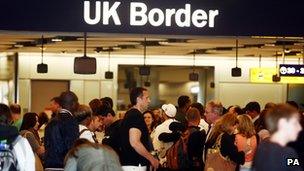Heathrow queues criticised in report
- Published

Staff are being drafted in ahead of a strike involving passport officers on Thursday
Long queues at Heathrow airport were caused by organisational changes and a lack of planning, an inspector says.
There were too few staff at peak times at Terminal 3's passport checks, said Chief Inspector of Borders and Immigration John Vine.
This damaged "the ability of border staff to maintain effective and efficient controls", he added.
Immigration Minister Damian Green said there were now more staff at peak times since last year's inspection.
The report on the UK Border Agency (UKBA) and the Border Force was based on 60 hours worth of data, collected in an inspection of Terminal 3 immigration between August and November last year.
Its release comes amid a row over queues which have seen passengers from outside the EU having to wait up to three hours in recent weeks.
Both the home secretary and immigration minister have pledged to deal with the delays, which are causing concern ahead of this summer's Olympics.
It also comes as back-up teams are drafted in at the UK's busiest airport to cover a national strike over pensions involving passport officers on Thursday.
The Immigration Services Union has warned people traffickers could exploit the strike action to smuggle people into the UK, <link> <caption>the Telegraph reported</caption> <url href="http://www.telegraph.co.uk/" platform="highweb"/> </link> .
'Busiest time'
Inspectors said new team structures, rotas and shift patterns had come as border staff numbers at Terminal 3 fell by 15% from 322 to 277 in the 12 months to last August.
The changes - which were designed to permanently improve the service - were "simply too much organisational change during the busiest time of the year", they warned.
The new team-based working, designed to ensure staff work in the same teams each day, brought a lack of flexibility, with low staffing numbers when passengers numbers were high and high staffing levels during quieter periods.
Mr Vine told BBC Radio 4: "The organisation is nearly 8,000 strong around the UK - so there are resources there. It is as much about how they are deployed as anything else."
A snapshot of passenger flows and staffing numbers for 9 October last year showed as passenger numbers fell between 1700 and 1900, staffing levels increased, but when the number of passengers began to increase again at 1900, the number of staff started to fall.
"I found that recent organisational changes such as the introduction of team-based working, a new shift working system and the amalgamation of immigration and customs roles had suffered from a lack of effective planning.
"Resources were not matched to demand, management oversight and assurance was lacking in many areas and staff were not always properly trained to undertake their duties.
"This was far too much organisational change during Heathrow's busiest time of the year.
"I remain concerned that this lack of planning has affected the agency's ability to maintain an effective and efficient border control."
The report found queue targets for passengers from outside the European Economic Area (EEA) were breached 62 times between 18 and 30 September last year, with the longest wait hitting two hours and 15 minutes.
Misleading figures
Queues for passport control at Terminal 3 were also not being properly recorded, the inspection concluded.
Mr Vine said the practice of recording queue lengths every hour on the hour had resulted in arbitrary, misleading figures for queuing times at Terminal 3.
"The measurement of that queue was not, in my view, as accurate as it should have been. The British Airports Authority measure the queues every 15 minutes."
"What I found elsewhere, for example at Gatwick, is that the agency works closer with the airport authorities to use the same data. I have made the recommendation, in the report, that the agency should work with British Airports Authority to come up with one set of data, which more accurately reflects the demand on the agency."
His report found 45 border officer posts had been cut over the past 12 months.
An examination of "search of person" records showed that in 67% of cases, the search was neither justified nor proportionate and the report also found the UKBA was failing to deal proactively with absconders.
Immigration Minister Damian Green said: "This report covers the period before the Border Force was split from the UK Border Agency and since then we have taken action to tackle these issues.
"We now have more staff at the border during peak times, greater flexibility to man immigration and customs controls, clearer guidance for staff on when vital checks are required and a national training programme with more emphasis on mentoring.
"A culture change is under way to make Border Force an organisation that effectively tackles illegal immigration, protects the UK from terrorism and detects crimes like drug trafficking and weapon smuggling."
In a separate report on Gatwick's North Terminal, Mr Vine said he was "very concerned" officers were using their own discretion when they had no power to do so.
One in seven decisions to allow entry were also not supported by evidence, a review of 103 cases showed.
These included cases with "clear attempted deception" and admitted breaches of immigration rules, the report said.
- Published6 May 2012
- Published5 May 2012
- Published2 May 2012